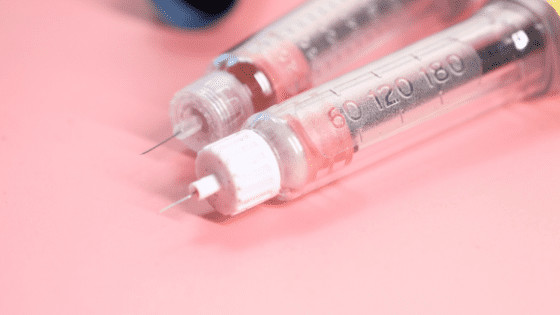Before Drs. Frederick Banting and Charles Best co-discovered insulin 100 years ago, people with diabetes were faced with a death sentence. Living with diabetes would kill, or maim people, and there was nothing they or their families could do.
Banting and Best knew insulin would be a gift to the world. Banting refused to put his name on the patent. He felt it was unethical for a doctor to profit from a life-saving discovery. His co-inventors, James Collip and Charles Best, sold the insulin patent to the University of Toronto for a mere $1.
The reason? They wanted everyone who needed the medication to be able to afford it.
The reality 100 years later? Diabetics are fighting for their lives, sharing insulin with one another, begging for insulin online, or worse – rationing, or going without because they can’t afford it, or find a way to get it.
Many of us are in a position where we might be able to afford our insulin today, but tomorrow is not promised.
We face a similar issue when it comes to other medications, tech, and devices. They’re expensive. They increase our quality of life, but diabetes management sometimes becomes about what you can afford to have, rather than what you need to manage in the best way. That situation has many of us making choices and sacrifices we never asked for.
So, it feels strange to get solicitations and sponsored ads fundraising for a cure when many don’t have access to one of the most profound discoveries of the 20th century.
A couple of weeks ago on my Facebook feed, I saw not one, but two ads fundraising for a cure for diabetes.
The first one was the first item in my feed. The second, just a few scrolls later.
Only my close friends knew, but I saw both of these messages while in the middle of wondering if I was going to be able to afford my own insulin after next month.
My husband’s company was sold, and his position was eliminated. We were given five days’ notice that he wouldn’t have a job anymore.
Since I’m self-employed, it also meant that we wouldn’t have health insurance. Luckily, it worked itself out, and he got a better job, with no lapse in employment. But there were a few days where the hypothetical plan we had in place (cashing out savings, or (our tiny) retirement funds to afford my medical costs) could’ve become real.
A couple of weeks back I had another sticky situation. My insurance wouldn’t cover the type of insulin my doctor wanted me to use. 5 insulin pens – a one-month’s supply for me – would have cost me $1,500 out of pocket. We figured it out, and I switched insulins. But it’s incredible to me that my insurance dictated my medical care. I had to change my care plan because of what I could afford.
I don’t condemn anyone for participating in these fundraisers. I don’t even blame diabetes organizations for fundraising, and pushing for a cure. An eventual cure would make life better. An eventual cure would make life easier. A cure for diabetes would completely change the world. A cure would save more lives (but something tells me we’d be having this same conversation about who has access to it).
But we’re living in the space between the discovery of insulin and a cure. And who knows how far away that cure might be, and what the cost of that cure may look like (not just in dollars – in time off of work, in recovery, in access, etc).
Every day, I see people legitimately asking to have their insulin and medication needs met. GoFundMe fundraiser after fundraiser posted and amplified. Selling art, or nude photos to meet funding goals.
People doing everything they can to make it.
Then, we see the grief from people who’ve lost their loved ones and are fighting every single day to ensure others don’t meet the same fate because they couldn’t afford their insulin and medications.
It’s a shock (but not a total surprise) that the largest organizations, who represent patients, clinicians, researchers, and the like don’t make more noise and more effort to change the trajectory of insulin, medication and device affordability.
Not just once a year, not just around the time to meet fundraising goals. Not just when advocates call them out for not doing it. Not just to appease. But every single day until it has changed.
National Diabetes Awareness Month is always interesting for me to witness. I talk about diabetes nearly every day, so I take a step back, and usually amplify other advocate voices instead of my own.
Not everyone understands diabetes – that’s why stigma is so prevalent. And not everyone knows that there isn’t a cure for diabetes.
Even more, people don’t understand the trajectory of the price of insulin since modern insulins were introduced. And how the price is only going to keep rising. Until so many people can’t afford it that the unimaginable happens.
These groups should be leading the message and lighting the fire. They make 10’s of millions of dollars fundraising for a cure, but what about access for millions of diabetics in the meantime? What if a cure is another 100 years away? And what happens when, inevitably, the costs of our tools to live keep increasing?
Affordability is absolutely downplayed by the biggest diabetes organizations, whose missions are to improve the lives of people with diabetes. It’s a footnote on every organization’s website, and even less most other times.
When the message does appear, it’s often directed to the patient to find a solution.
The American Diabetes Association’s insulinhelp.org website references that patients should talk to their healthcare team if they’re worried about the cost of their insulin.
For providers, the recommendation includes prescribing human insulin, which is cheaper insulin, but requires more of patients, and might not be the most appropriate for care.
“We recommend providers “prescribe the lowest-priced insulin required to effectively and safely achieve treatment goals,” which may include using human insulin in selected patients.”
American Diabetes Association – Insulinhelp.org
The Juvenile Diabetes Research Fund (JDRF) has a webpage on insulin affordability principles. But most, if not all fundraising efforts are centered around a cure – not fighting for access and affordability for patients.
Young patients with diabetes in the US are going to grow up to be 26-year-olds who are removed from their parents’ insurance and are on their own to get good jobs – with good insurance – so they don’t have a disruption in care. Honestly, their parents may struggle with affordability now. But they’re being asked to support a cure today.
Affordability messaging often exists in the background.
Although Beyond Type 1 has had some major missteps in fighting for insulin affordability, they do now acknowledge that people do not have equitable access to insulin when talking about insulin and insulin products as advocates have pushed back.
Their advocacy page leads with insulin affordability, as well as systemic issues can that reduce insulin access.
Is it perfect? No. Should there be more emphasis? Definitely. As with every single organization that’s funded to fight for people with diabetes.
If I didn’t name an organization here, it’s not because they’re perfect, by any means, but the ones I did talk about are the largest examples of a need to acknowledge what we’ve lost, and what we continue to lose when people with diabetes can’t afford what we need to live.
When you don’t acknowledge what we’ve lost, and what we stand to lose while we’re waiting for a cure, you ignore a glaring issue in our community that a cure alone won’t fix. You ignore pain. You ignore grief.
We can’t only celebrate the discovery of insulin when the access isn’t equitable.
Organizations can’t sit by and let affordability continually be the elephant in the room, without being the ones to amplify the conversation. Advocates have been straightforward in sharing about it, supporting each other, and doing what’s possible to keep each other alive.
We have each other’s backs when no one else has it for us.
Imagine what could happen if every org that says they advocate for us put a focus on that same support.
Diabetes Awareness Month often focuses on the positive, without acknowledging some of the deep hardships and disparities that exist in our community.
I – more than anyone I know – love celebrating the good in diabetes. I’m grateful for the community I have, and the friends I’ve made. Diabetes gave me strength and persistence I’ve never known I possessed.
Having diabetes has taught me to fight like hell for myself – and not stop. With this illness, I’ve been given a life I’ve never imagined. Sometimes it’s for the better, sometimes for the worse.
But even when I have positive moments with diabetes, I won’t turn my head and pretend like the things that make me uncomfortable don’t exist. I wish all of the orgs campaigning for our dollars would face it with us.
This may sound bitter, and jaded. But, I feel like the conversation is going to focus on celebrating the discovery of insulin, but little reflection about the dire situation patients and caregivers can find themselves in at any moment.
I hope that I can eat my words. I hope I’m wrong. I hope that every org gives this conversation the attention it deserves now, and after this month is over. Not just when it’s beneficial, but until every person with diabetes has access to what they need.
That’s all I can hope for.























